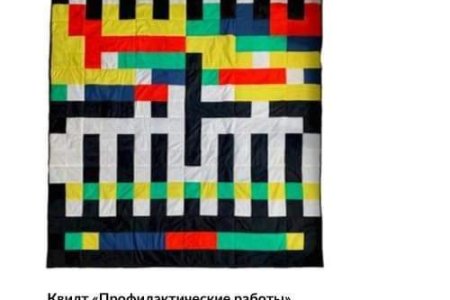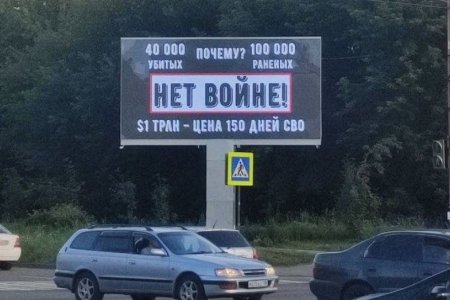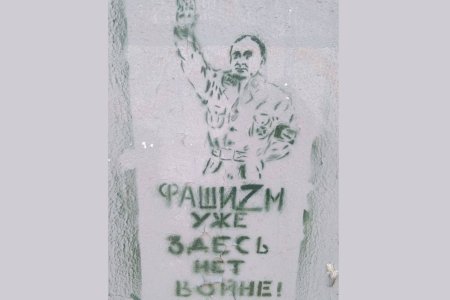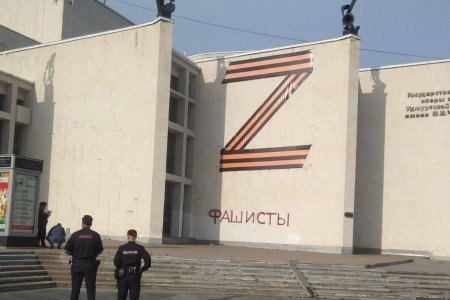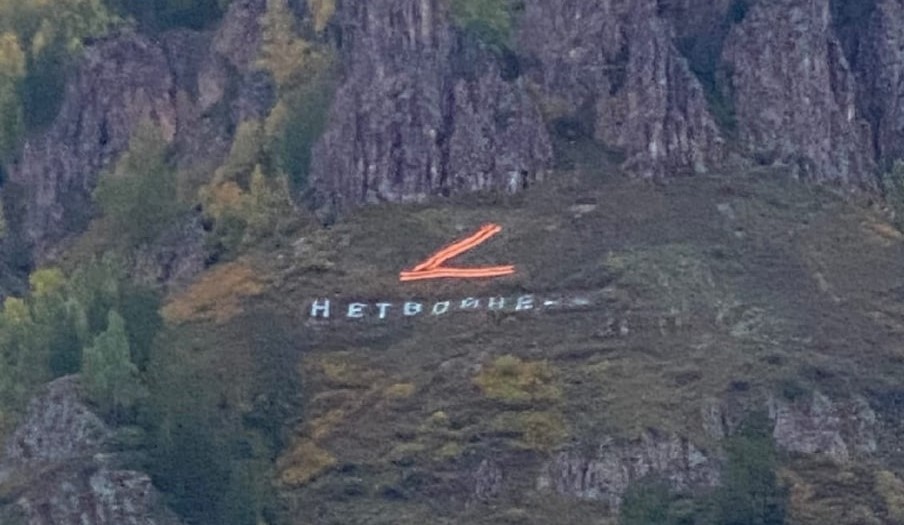
This spring a large letter “Z”, a Zwastika as it’s now called, was painted on a hillside opposite a town in central Siberia (Krasnoyarsk Region). Beneath the letter, large stones were assembled to spell the town’s name DIVNOGORSK.
Recently an unidentified protestor clambered up the hillside, took one bar off the Z and rearranged the stones to read “No to the War”.
Prima Donna opposes war
On Sunday 18 September, Alla Pugachova, star of stage and screen since the 1970s, posted an appeal to the Ministry of Justice on Instagram, requesting that she be declared a “foreign agent”. Her statement was made in solidarity with her husband the comedian Maxim Galkin, who has spoken out against the war in Ukraine.
Pugachova explained that Galkin is “an honest, upstanding and sincere person, a genuine and incorruptible Russian patriot. He wishes to see his Motherland flourish and enjoy a peaceful life and freedom of speech; he wants an end to the deaths of our lads for the sake of illusory goals that are turning our country into a pariah and making life hard for our citizens.”
The Russian authorities declared Galkin a “foreign agent” on Friday 16 September. Pugachova returned to Russia in early September after a lengthy absence.
Her announcement went viral and in the space of a few hours the number of subscribers to her Instagram channel rose from 3.3 to 3.4 million. So far, the RF Ministry of Justice has not responded.
Another musician speaks out
The well-known rapper Oxxxymiron (Myron Fyodorov) released an anti-war video clip on Friday 16 September entitled “Oida”, after returning to St. Petersburg where it was filmed.
In less than an hour, the clip became the most viewed on YouTube, drawing more than 1.5 million views: by Monday it already had three million views.
Several hours after its appearance the “Call of the Nation” movement demanded that the Investigative Committee and the Prosecutor-General’s Office examine the clip for “extremism”. Among the movement’s objections was the line, “On our flag are white snow and a blue river”: the white and blue flag is a symbol of the anti-war movement in Russia.
After the invasion of Ukraine, Oxymoron left Russia. He publicised his anti-war views when abroad and gave performances in support of Ukrainian refugees. As a result, he was added to the list of “banned performers”. It is not known whether he will now remain in Russia.
Elections, a chance to protest
Photos and statistics are now available for the elections held between Friday and Sunday, 9-11 September. Many Russian citizens used the occasion to express their anti-war opinions. The “Green Sash” Telegram channel promoted the “Vote against” protest. Voters marked their choice of candidate with the peace sign instead of a tick or a cross.
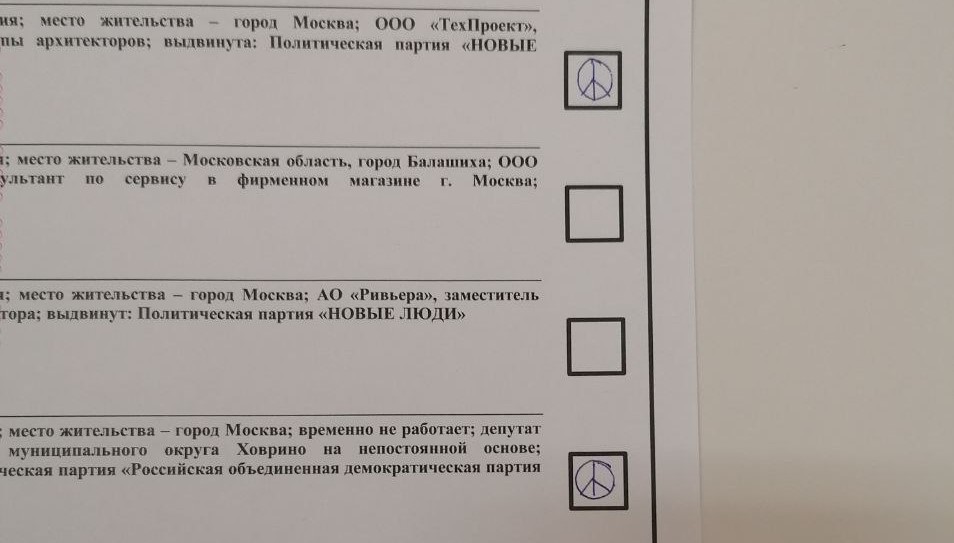
*
Various comments and captions were written on election bulletin papers: “Screw the war!”, “No to this criminal war!”, “No to the War, no to Russian fascism”, “No to the War! Freedom for Russia! Glory to Ukraine! Putin’s a dickhead”, “No to the War! Get out of Ukraine!” and “Death to Imperial Russia! Peace and prosperity to Ukraine!”
Many were arrested for protesting during the elections. On Sunday 11 September, Lev Karmanov was arrested at one of Moscow’s polling stations after he wrote “No to the War” on his bulletin paper and added the dove of peace. The police charged him with “discrediting” the army and the same day a court fined him.
*
That Sunday in Kirov (Volga) a local woman Natalya Ryabova was arrested for writing “Putin’s a *****, Glory to Ukraine, Russia shall be free” on a bulletin paper during the election of the governor. She was charged with “discrediting” the Russian army.
*
On Tuesday 13 September, Darya Sergeyeva was charged in Aramali (Sverdlovsk Region, Urals) with publishing on social media a photo of a bulletin with anti-war slogans.
*
Observers who covered home voting at the elections noticed the slogan “No to the War” in the lift of an apartment block in Moscow’s Basmanny district.
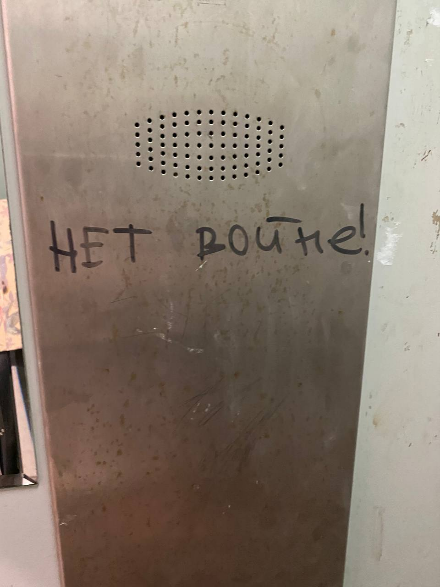
Deputies oppose war and Putin’s policies
More than 60 municipal deputies from all over Russia have now signed a letter to the State Duma, proposing that Putin be dismissed from the post of Russian president. The appeal was launched on Wednesday 7 September by five deputies from St Petersburg’s Smolninsky district.
The appeal declares that the “president’s decision to start a ‘special military operation’ is harming the security of Russia and its citizens” and suggests that Putin be removed from his post “by reason of State treason”.
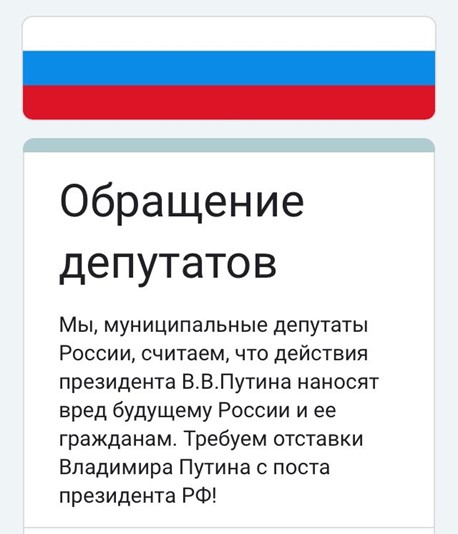
Over a number of days, the five deputies have been brought to trial and found guilty of “discrediting” the Russian army. Each was fined 15 Minimum Monthly Wages or 225,000 roubles. Their case was reported by the Net Freedoms project.
The Smolninsky district court also tried to abolish the district council for “inactivity”.
*
Ksenia Thorstrom, a municipal deputy from St Petersburg’s Semyonovsky district, is continuing to gather signatures on the appeal for the dismissal of Vladimir Putin as president of Russia. At first deputies from 18 municipal districts in Moscow and St Petersburg added their names. During the week municipal deputies from Samara, Yakutsk, Novgorod and Voronezh signed the petition, bringing the total to more than sixty.
The Bumaga periodical has published a detailed account of the Smolninsky deputies' protest and how they decided to draw up such a petition.
Russia protests
On Sunday 11 September, Alexander Dmitriev held a protest on Pushkin Square in the centre of Moscow. His placard read, “200 days of war. 600 days in prison – free Alexei Navalny. Free our political prisoners. Smart voting. Vote against the conmen and crooks!” He was arrested by the police who charged him with ‘discrediting’ the army (Article 20.3.3, Administrative Offences).
*
On Tuesday 13 September, a member of the Politics 2.0 Movement Julia Stadnichuk was arrested by police in Moscow outside FSB headquarters on Lubyanka Square. She had come to submit a declaration blaming Putin “for unleashing a criminal war against a fraternal nation”.
The police took the arrested woman into the reception of the FSB building.
*
On Monday 12 September, a criminal case was opened against activist Sergei Vesyolov in the Ivanovo Region (Central Russia).
Charged under Article 280.3, pt. 1 (Criminal Code) with repeated ‘discreditation’ of the army, he is incriminated with the speech he delivered during the appeal against a previous conviction for ‘discrediting’ the Russian army. Vesyolov recorded and circulated the speech on YouTube. In it he accused Russia of attacking Ukraine.
Vesyolov is also accused of vandalism because of a slogan “No to the War” painted on the city administration building.
*
In the city of Voronezh (Central Russia; pop. 997,000) [1] Lydia Yardova was arrested on Saturday 17 September for holding a one-woman protest next to the Chizhov Galleries shopping centre. Her placard read, “Free all political prisoners: Navalny, Yashin, Safronov. No to ******”.
*
On Wednesday 14 September, a court in Tula (Central Russia; pop. 497,000) fined a man 2 ½ Minimum Wage packets (40,000 roubles) for ‘discrediting’ Russia’s armed forces (Article 20.3.3). In the presence of two other people, he supposedly said “I hate Vladimir Putin, the Russian president, for the harm his military operation is doing. My own close family is suffering from it”. “I’d take him out and shoot him,” he added.
*
The central district court in Voronezh fined a 60-year-old local man 30,000 roubles for ‘discrediting’ the Russian army (Article 20.3.3) after he held a one-man protest in the city. He carried a placard, but it’s not known what was written on it.
*
Alexander Grigoryev, a 60-year-old construction worker from Lipetsk (Central Russia) faces a criminal investigation for spreading ‘fake news’ about the Russian army (Article 207.3, pt. 2, Criminal Code). The pretext was an anti-war text he published on Yandex.Zen. Grigoryev commented
“I’m for peace throughout the world – that’s what I was taught in school back in the Soviet days. My father fought in the war, and he was determined that we should never see war. Now Russia has attacked Ukraine, do you think I should support that?”
*
On Monday 13 September, an inhabitant of Chelyabinsk (Urals; pop. 1.15million) held a solitary protest in the city centre. He carried a placard that read, “Stop the War. Glory to Ukraine!” He was arrested almost at once and taken to the police station– https://t.me/ovdinfolive/13569 – where he was charged.
*
In Samara (Volga; pop. 1.17 million) Nikolai Kovalenko held a one-man protest on Wednesday 15 September, carrying a placard in the colours of the Ukrainian flag– https://t.me/ovdinfolive/13581 – with the words “No to the War”. He was arrested and taken to the police station.
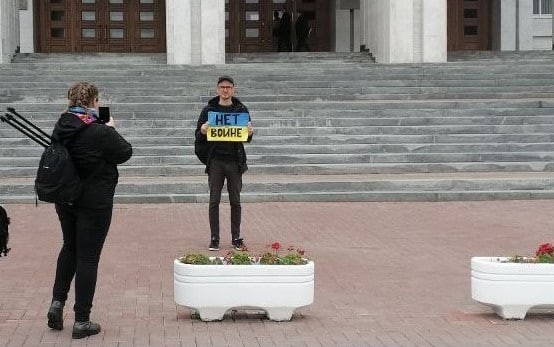
*
On Wednesday 15 September, Pyotr Safroshkin was arrested by the police in the centre of Moscow outside the Tretyakovskaya metro station. He was holding a placard that read “200 days of blood and pain. Do you really want more?”
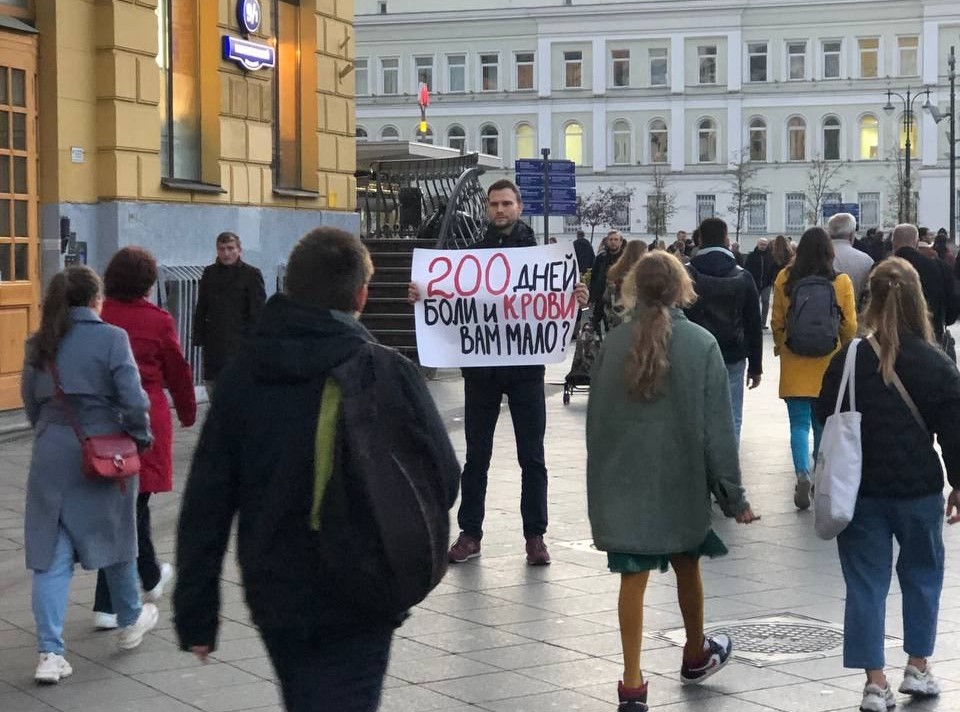
*
Ksenia Tenyaeva was arrested next to Moscow’s Bolshoi Theatre on Friday 17 September after she unfurled a placard reading “No to the War”.
*
The previous week, on Wednesday 7 September, Dmitry Mashkov an activist from Chelyabinsk held a one-man protest carrying a placard that read: “We’re all human beings. Why can’t we live in peace? It’s 196 days since the war began. We don’t need a war. Stop war!” On Friday 17 September, a court in Chelyabinsk imposed a fine on Mashkov for ‘discrediting’ the army (Article 20.3.3, pt. 1).
*
The same day Konstantin Fokin was arrested by the police on Pushkin Square in the centre of Moscow for protesting with a placard reading, “Stop the killing!”
*
In Volgograd (Volga; pop. 1 million) a court fined Vitaly Gotra 330,000 roubles for his eleventh offence of ‘discrediting’ the Russian army (Article 20.3.3). Earlier Gotra was fined 360,000 roubles for committing 12 offences under the same Article (see Digest [E], 15-22 August 2022).
Altogether Gotra has been charged more than 40 times, some of the charges were for distributing anti-war stickers.
*
In Kaliningrad (Northwest; pop. 438,000) the police arrested a man who protested against military operations in Ukraine with a placard that read “No to [the Media Oversight Agency]” [2]. The protestor was taken to a police station, reports OVD-Info.
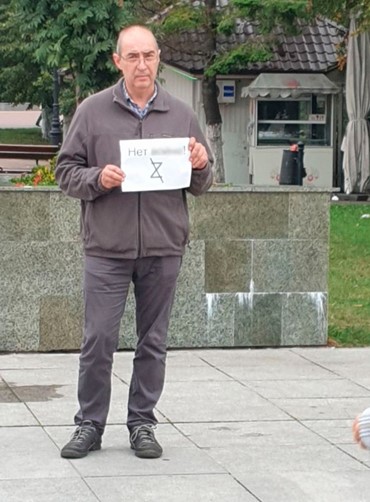
*
In the north Urals (Khanty-Mansiisk autonomous district) FSB and police officers searched the living quarters of former soldier Pavel Verbitsky. He again faces charges of ‘discrediting’ the Russian army after an online commentary in which he compared Russian soldiers to orcs and fascists and the letter Z to a scribble in a street toilet.
Verbitsky has already paid a fine for his earlier offence under Article 20.3.3.On this occasion his computer was seized, his flat was searched and he was told that criminal charges would be brought against him.
*
Defence attorney Dmitry Talantov has been held in the investigation & detention centre (SIZO) in Izhevsk since 28 June for spreading ‘fake news’ about the Russian army (Article 207.3, pt. 2 [d], Criminal Code).
Four new incidents have now been added to his case and charges are being brought under Article 282 of the Criminal Code (pt. 2 [b]) for ‘inciting hatred’. Talantov faces up to 15 years imprisonment. He was first taken into custody for a post on Facebook (see Digest [E] 25 June-2 July 2022) in which he compared the actions of the Russian army in Mariupol, Irpen and Bucha to the behaviour of the Nazis in World War Two.
*
Over the past six months Russia’s courts have registered 105 criminal cases of circulating ‘fake news’ about the army. After ten trials, one of which resulted in an acquittal, sentences have been handed down in nine cases. Another 16 cases are presently being heard. This was what Pavel Chikov, head of the Agora human rights group, told the Bumaga periodical.
Visual protests
In the St Petersburg metro peace signs in the colours of the Ukrainian flag have appeared on the walls of its underground carriages.

*
Challenging the Zwastika opposite Divnogorsk in central Siberia (Krasnoyarsk Region) – see lead story.
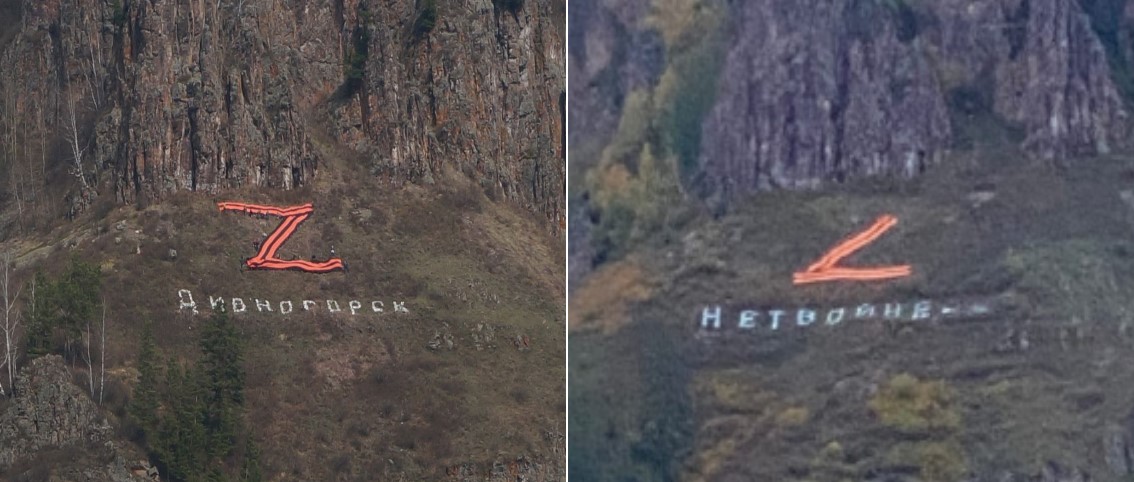
The media battle on
On Tuesday 13 September, the Tagansky district court in Moscow fined Novaya gazeta 400,000 roubles after convicting the newspaper of ‘discrediting’ the Russian army.
The Supreme Court, meanwhile, ruled that the Novaya gazeta website should be deprived of its license to function as a media outlet. The plea was brought by the RF Media Oversight Agency (Roskomnadzor), as Novaya gazeta (Europe) describes. The pretext for this decision was the two warnings given to the newspaper for failing to mention the ‘foreign agent’ status of organisations referred to in its reports.
*
The “Support Service” channel has published an interview with the Russian citizen who, on Victory Day 2022 (9 May), hacked into major TV channels in Russia. Hundreds of thousands of Russian citizens read these words on their TV screens: “Your hands are covered in the blood of thousands of Ukrainians and hundreds of their murdered children. Television and the authorities are lying to you. No to the War”.
The hacker described how he was able to make his protest and spoke of his hopes that he could ‘re-programme’ and ‘dezombify’ those watching mainstream Russian TV.
*
The Petersburg-based periodical Bumaga has issued a new podcast in English, The Russian Resistance[E], with activist Andrei Shestakov who comes from the town of Neryungri in Yakutia (Far East).
The latest issue of The Russian Resistancecan be heard in Castbox.
Shestakov is a former policeman, a veteran of the Ministry of Internal Affairs, and a secondary-school teacher. He describes how school textbooks are being rewritten, what children think about the war, and why the regime profits from the degeneration of the educational system.
After the war began, Andrei condemned the invasion of Ukraine in a chat with his pupils. Someone informed on him. The FSB put Shestakov under surveillance for his opposition views.
*
Bumaga has also recently published (in English) the story of Alexander Pravdin, author of an anti-war newssheet in the small town of Siversky (Leningrad Region, Northwest). For several months (see Digest [E], 23-29 July 2022) Pravdin has drawn and distributed his anti-war newssheet, an activity for which the police have repeatedly charged him.
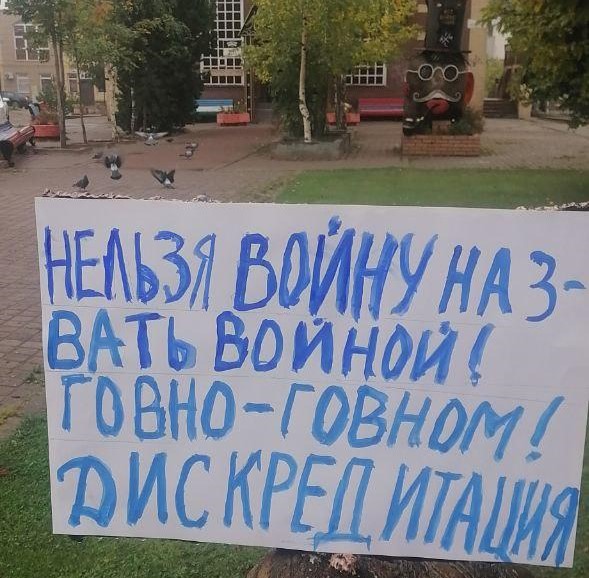
NOTES
[1] Cities, towns and 21st-century communications
The population of Russia is distributed between 16 cities with a million and more inhabitants (Moscow has 13 million; St Petersburg, 5.6 million), 290 smaller cities, a great number of towns with under 50,000 residents and a rural population of 17 million.The most populous of the eight Federal Districts are Central Russia (39 million) and the Volga Federal District (30 million) see Digest [E], 27 July-5 August 2022.
Until this century the news, like other goods and services, was channeled first to Moscow and then redistributed as the country’s rulers saw fit. That changed with the advent of mobile phones and the internet. A frequent source for this digest makes that shift explicit: “Stop reading the Moscow media!” 7x7, Horizontal Russia urges visitors to its website.
[2] The Russian Media Oversight Agency
Formal censorship ended in the last years of the Soviet era. Ownership and / or control over nationwide media (TV, radio, newspapers and magazines) by the State and extensive self-censorship have since 2008 been supplemented by the activities of the Media Oversight Agency, Roskomnadzor, which monitors the media, especially online.
SOURCES
Memorial volunteers have assembled this digest from information in the following and in other sources: online newspapers (Bumaga periodical and Novaya gazeta (Europe)); encrypted Telegram channels (OVD-Info (Telegram) and Green Sash (Telegram)); and a variety of websites (24 live, OVD-Info express news, and the Net Freedoms project.).
Translation, John Crowfoot
